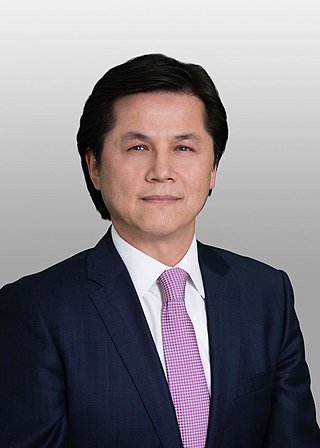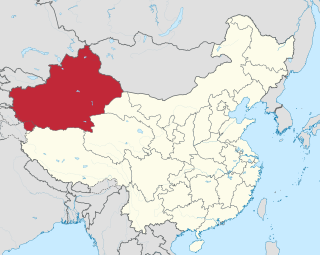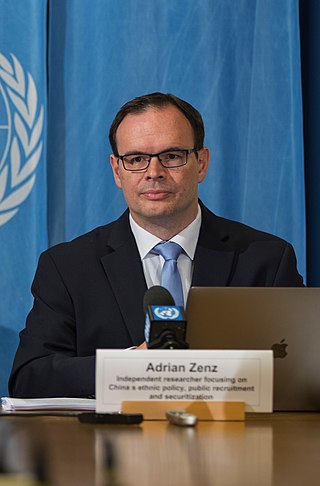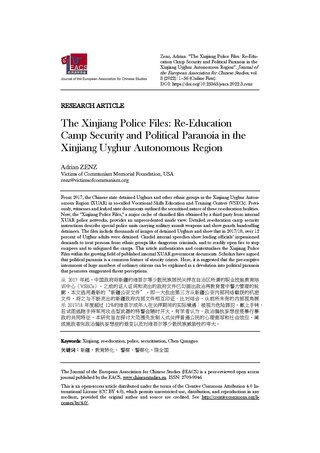Human rights in China are periodically reviewed by international bodies, such as human rights treaty bodies and the United Nations Human Rights Council's Universal Periodic Review. The Chinese Communist Party (CCP), the government of the People's Republic of China (PRC), their supporters, and other proponents claim that existing policies and enforcement measures are sufficient to guard against human rights abuses. However, other countries, international non-governmental organizations (NGOs) including Human Rights in China and Amnesty International, and citizens, lawyers, and dissidents inside the country, state that the authorities in mainland China regularly sanction or organize such abuses.

The Id Kah Mosque is a historic mosque and tourist site located in Kashgar, Xinjiang, China.

The United States foreign policy toward the People's Republic of China originated during the Cold War. At that time, the U.S. had a containment policy against communist states. The leaked Pentagon Papers indicated the efforts by the U.S. to contain China through military actions undertaken in the Vietnam War. The containment policy centered around an island chain strategy. President Richard Nixon's China rapprochement signaled a shift in focus to gain leverage in containing the Soviet Union. Formal diplomatic ties between the U.S. and China were established in 1979, and with normalized trade relations since 2000, the U.S. and China have been linked by closer economic ties and more cordial relations. In his first term as U.S. president, Barack Obama said, "We want China to succeed and prosper. It's good for the United States if China continues on the path of development that it's on".

Nury Ablikim Turkel is an American attorney, public official and human rights advocate based in Washington, D.C. He is currently Chair of the United States Commission on International Religious Freedom (USCIRF).

The Australian Strategic Policy Institute (ASPI) is a defence and strategic policy think tank based in Canberra, Australian Capital Territory, founded by the Australian government, and funded by the Australian Department of Defence along with overseas governments, and defence and technology companies.
Racism in China arises from Chinese history, nationalism, sinicization, and other factors. Racism in the People's Republic of China has been documented in numerous situations. Ethnic tensions have led to numerous incidents in the country such as the Xinjiang conflict, the ongoing internment and state persecution of Uyghurs and other ethnic minorities, the 2010 Tibetan language protest, the 2020 Inner Mongolia protests, discrimination against Africans in particular and discrimination against Black people in general.

China–Palestine relations, also referred to as Sino–Palestinian relations, encompasses the long bilateral relationship between China and Palestine dating back from the early years of the Cold War.

Chen Quanguo is a Chinese retired politician who was the Chinese Communist Party Committee Secretary of Tibet Autonomous Region from 2011 to 2016 and of the Xinjiang Uyghur Autonomous Region from 2016 to 2021, making him the only person to serve as the Party Secretary for both autonomous regions. Between 2017 and 2022, he was a member of the 19th Politburo of the Chinese Communist Party and was also Political Commissar of the Xinjiang Production and Construction Corps concurrently with his position as Xinjiang Party Secretary.

The Xinjiang conflict, also known as the East Turkistan conflict, Uyghur–Chinese conflict or Sino-East Turkistan conflict, is an ongoing ethnic geopolitical conflict in what is now China's far-northwest autonomous region of Xinjiang, also known as East Turkistan. It is centred around the Uyghurs, a Turkic ethnic group who constitute a plurality of the region's population.
Zhu Hailun is a retired Chinese politician who was the current vice chairman of the Standing Committee of the People's Congress of Xinjiang Uygur Autonomous Region. Previously he served as the deputy party secretary of the Xinjiang Uyghur Autonomous Region. Between 2009 and 2016, Zhu was the party chief of Urumqi, the capital of the Xinjiang region.

Islamophobia in China refers to the set of discourses, behaviors and structures which express feelings of anxiety, fear, hostility and rejection towards Islam and/or Muslims in China.

The Xinjiang internment camps, officially called vocational education and training centers by the government of China, are internment camps operated by the government of Xinjiang and the Chinese Communist Party Provincial Standing Committee. Human Rights Watch says that they have been used to indoctrinate Uyghurs and other Muslims since 2017 as part of a "people's war on terror", a policy announced in 2014. The camps have been criticized by the governments of many countries and human rights organizations for alleged human rights abuses, including mistreatment, rape, and torture, with some of them alleging genocide. Some 40 countries around the world have called on China to respect the human rights of the Uyghur community, including countries such as Canada, Germany, Turkey, Honduras and Japan. The governments of more than 35 countries have expressed support for China's government. Xinjiang internment camps have been described as "the most extreme example of China's inhumane policies against Uighurs".

The Chinese government is committing a series of ongoing human rights abuses against Uyghurs and other ethnic and religious minorities in Xinjiang that is often characterized as persecution or as genocide. Beginning in 2014, the Chinese government, under the administration of Chinese Communist Party (CCP) General Secretary Xi Jinping, incarcerated more than an estimated one million Turkic Muslims without any legal process in internment camps. Operations from 2016 to 2021 were led by Xinjiang CCP Secretary Chen Quanguo. It is the largest-scale detention of ethnic and religious minorities since World War II. The Chinese government began to wind down the camps in 2019. Amnesty International states that detainees have been increasingly transferred to the formal penal system.

The China Cables are a collection of secret Chinese government documents from 2017 which were leaked by exiled Uyghurs to the International Consortium of Investigative Journalists, and published on 24 November 2019. The documents include a telegram which details the first known operations manual for running the Xinjiang internment camps, and bulletins which illustrate how China's centralized data collection system and mass surveillance tool, known as the Integrated Joint Operations Platform, uses artificial intelligence to identify people for interrogation and potential detention.

The Uyghur Human Rights Policy Act of 2020 is a United States federal law that requires various federal U.S. government bodies to report on human rights abuses by the Chinese Communist Party (CCP) and the Chinese government against Uyghurs in Xinjiang, China, including internment in the Xinjiang re-education camps.

Adrian Nikolaus Zenz is a German anthropologist known for his studies of the Xinjiang internment camps and persecution of Uyghurs in China. He is a director and senior fellow in China studies at the Victims of Communism Memorial Foundation, an anti-communist think tank established by the US government and based in Washington, DC.

Vicky Xiuzhong Xu is a China-born Australian journalist and writer. She is best known for investigative work on human rights abuses in China. During and after college, she wrote for the New York Times from Beijing, Melbourne, and Sydney. In 2020, Xu authored the report, Uyghurs for Sale, stating many Uyghurs from Xinjiang had been moved to China proper for forced labour. This reported was widely read and cited by media outlets, legislations and prosecutors in Australia, the US and Europe.

The Uyghur Tribunal was an independent "people's tribunal" based in the United Kingdom aiming to examine evidence regarding the ongoing human rights abuses against the Uyghur people by the Government of China and to evaluate whether the abuses constitute genocide under the Genocide Convention. The tribunal was chaired by Geoffrey Nice, the lead prosecutor in the trial of Slobodan Milošević, who announced the creation of the tribunal in September 2020.

The Xinjiang Police Files are leaked documents from the Xinjiang internment camps, forwarded to anthropologist Adrian Zenz from an anonymous source. On May 24, 2022, an international consortium of 14 media groups published information about the files, which consist of over 10 gigabytes of speeches, images, spreadsheets and protocols dating back to 2018.
The OHCHR Assessment of human rights concerns in the Xinjiang Uyghur Autonomous Region, People's Republic of China is a report published on 31 August 2022 by the Office of the United Nations High Commissioner for Human Rights (OHCHR) concerning the treatment of Uyghurs and other largely Muslim groups in China. The report concluded that "[t]he extent of arbitrary and discriminatory detention of members of Uyghur and other predominantly Muslim groups, pursuant to law and policy, in context of restrictions and deprivation more generally of fundamental rights enjoyed individually and collectively, may constitute international crimes, in particular crimes against humanity." Human rights commissioner Michelle Bachelet released the report shortly before leaving the office.